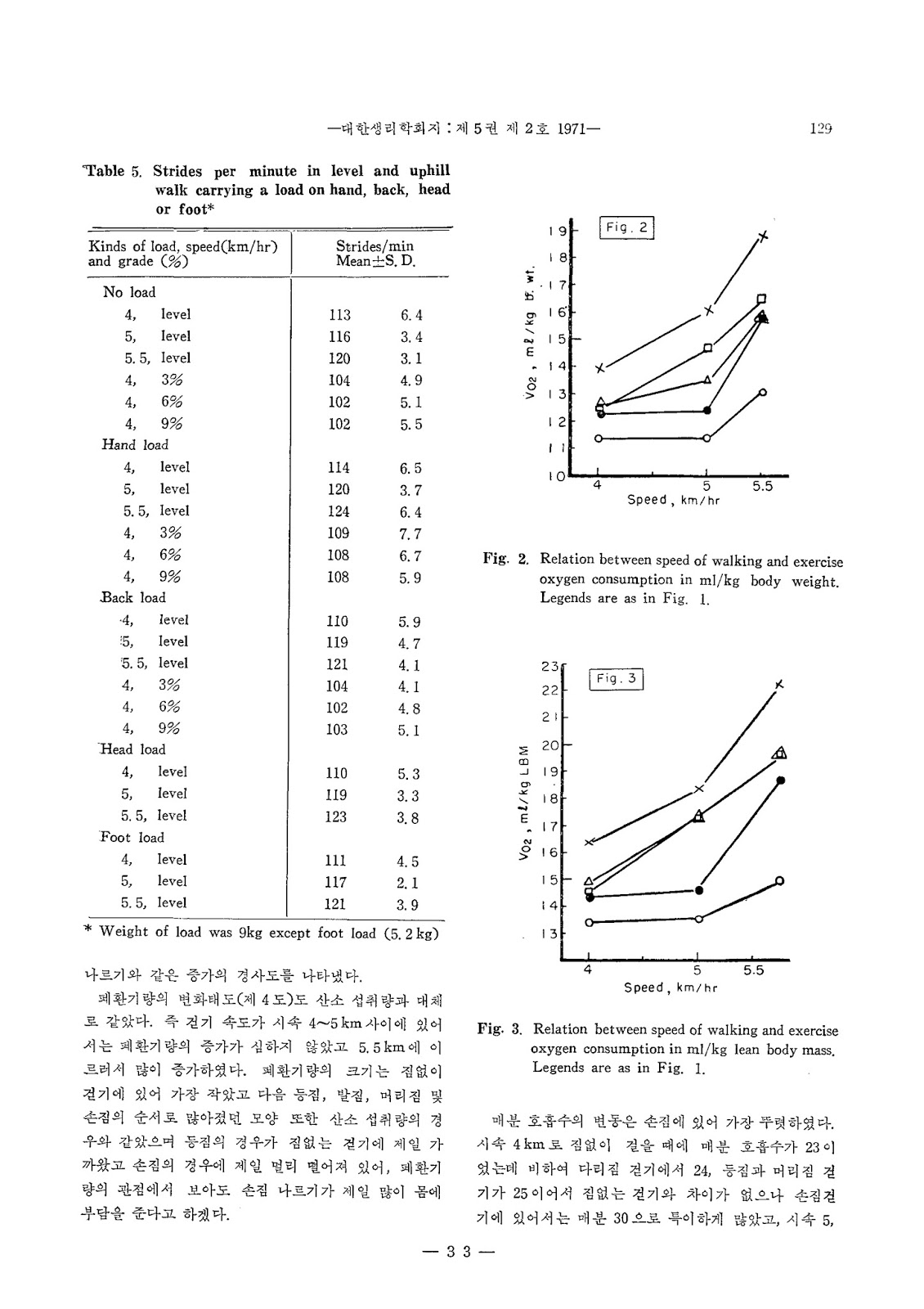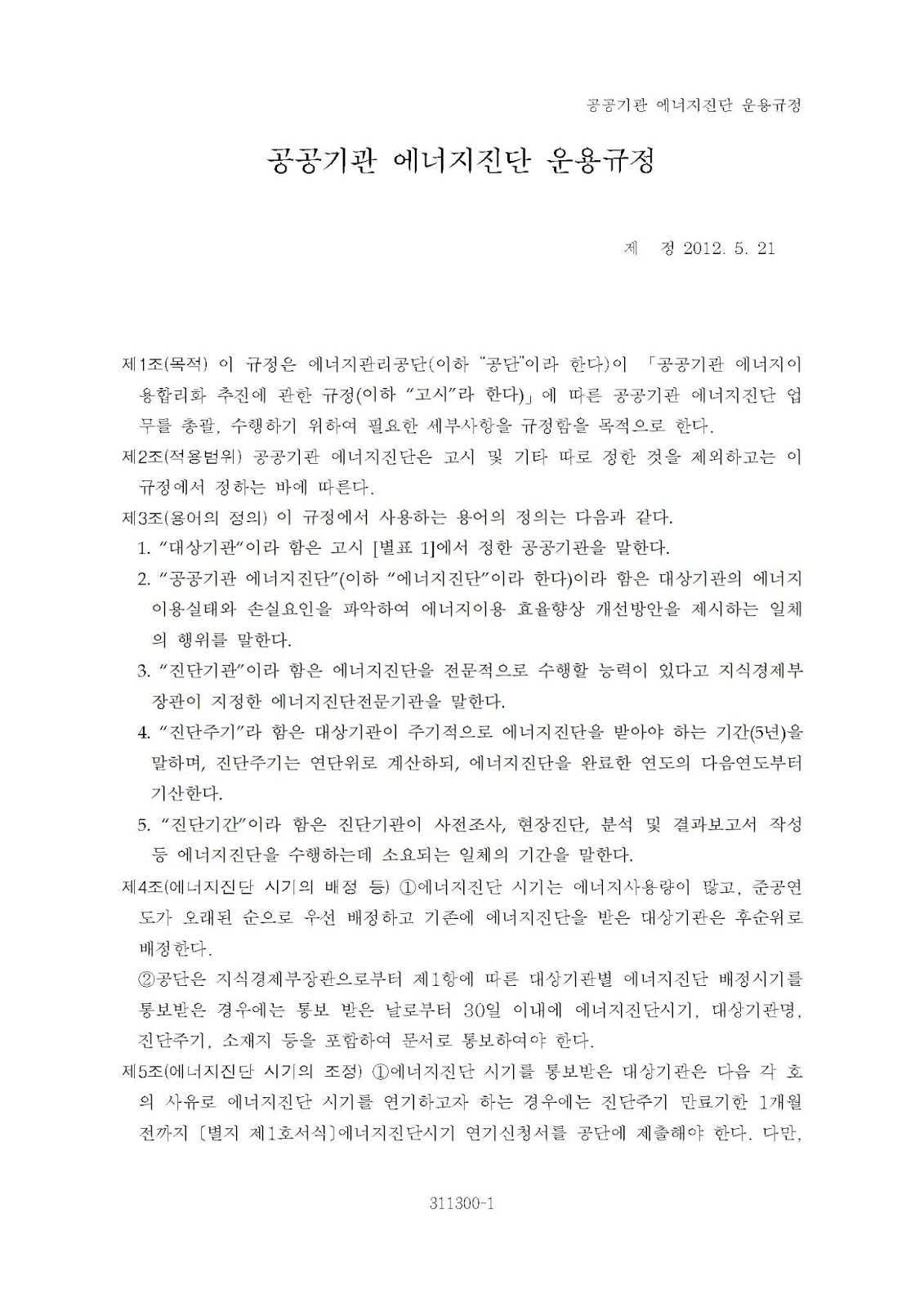짐나르기의 에너지 소요량
짐나르기의 에너지 소요량
Energy cost of loads carried on the hands, head, or feet
저자명 황대연, 남기용
문서유형 학술논문학술지대한생리학회지 5,2('71.12) pp.29-40 0300-4015 SCOPUS
발행정보 대한생리학회 |1971년 |한국 |한국어
주제분야 의약학 > 생리학
서지링크 국회도서관 (청구기호 612.05 ㄷ242) , KISTI
<초록>
Oxygen consumption, pulmonary ventilation, heart rate, and breathing frequency were measured on 8 men walking on a treadmill carrying load of 9 kg on hand, back, or head. Besides measurements were made on subjects carrying loads of 2.6 kg each on both feet. The speed of level walking was 4, 5, and 5.5km/hr and a fixed speed off km/hr with grades of 0, 3, 6, and 9%. Comparisons were made between free walking without load and walking with various types of loads. The following results were obtained. 1. In level or uphill walking the changes in oxygen consumption, pulmonary ventilation, breathing frequency and heart rate were smallest in back load walking, and largest in hand load walking. The method of back load was most efficient and hand load was the least efficient. The energy cost in head load walking was smaller than that of in hand load walking. It was assumed that foot load costed more energy than hand load. 2. In level walking the measured parameters increased abruptly at the speed of 5.5 km/hr. Oxygen consumption in a free walking at 4 km/hr was 11.4ml/kg b.wt., and 13.1 ml/kg b.wt. 5.5 km/hr, and in a hand load walking at 4 km/hr was 13.9, and 18.8 ml/kg b. wt. at 5.5 km/hr. 3. In uphill walking oxygen consumption and other parameters increased abruptly at the grade of 6%. Oxygen consumption at 4 km/hr and 0% grade was 11.4 ml/kg b. wt., 13.6 at 6% grade, and 16.21/kg b. wt. at 9% grade in a free walking. In back load walking oxygen consumption at 4km/hr and 0% grade was 12.3 ml/kg b.wt.,14.9 at 6% grade, and 18.7 ml/kg b.wt. In hand load walking the oxygen consumption was the greatest, namely, 13.9 at 0% grade, 17.9 at 6%, and 20.0 ml/kg b. wt. at 9% grade. 4. Both in level and uphill walking the changes in pulmonary ventilation and heart rate paralleled with oxygen consumption. 5. The changes in heart rate and breathing frequency in hand load were characteristic. Both in level and uphill walk breathing frequency increased to 30 per minute when a load was held on hand and showed a small increase as the exercise became severe. In the other method of load carrying the Peak value of breathing frequency was less than 30 Per minute. Heart rate showed 106 beats/minute even at a speed of 4 km/hr when a load was held on hand, whereas, heart rate was between, 53 and 100 beats/minute in the other types of load carriage. 6. Number of strides per minute in level walking increased as the speed increased. At the speed floater than 5 km/hr number of strides per minute of load carrying walk was greater than that of free walking. In uphill walk number of strides per minute decreased as the grade increased. Number of strides in hand load walk was greatest and back load walk showed the same number of strides as the free walk.

녹색건축인증 조성법' 및 '건물에너지 소비증명제'가 의무화되어 시행되고 있습니다.
저희 (주)한국녹색인증원은 '지속가능한 저탄소 녹색건축인증 기술연구소'의 전문기업으로 설립되어, 빠른 제도 변화와 변모하는 건설환경에 이바지하고자 합니다. (주))한국녹색인증원은 건축, 도시, 생태분야가 녹색건축물에 접목될 수 있도록 적절한 요소분석을 통해 에너지 절감형 건축, 자생적 생태환경, 온열환경, 빛환경의 면밀한 조사와 연구로 고객의 삶의 질 향상 및 더 나아가 인류의 존속성에 그 목적을 두고 있습니다. 한국녹색인증원은 친환경컨설팅 전문업체로 주택성능등급, 그린홈, 에너지소비총량제, 에너지성능지표검토서, 건물에너지효율등급, 장수명주택인증, CPTED, BF 인증 등 각종 친환경 건축물 인증 을 컨설팅 해드리고 있습니다. 녹색건축인증 의 선도기업이 되겠습니다.













(%EC%A0%9C19819%ED%98%B8)(20250501)001.jpg)
(%EC%A0%9C34657%ED%98%B8)(20240710)001.jpg)
댓글
댓글 쓰기